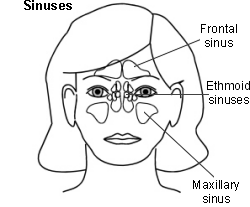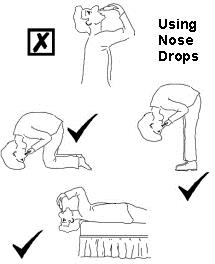Cystic Fibrosis and Nasal Problems
by Mr Paul Nix, 2018
Just as the cells that line the airways of the lungs make sputum (mucus) that is thicker than normal in cystic fibrosis this process also occurs in the nose. Many cystic fibrosis patients develop chronic problems with the nose and sinuses in particular chronic sinusitis and nasal polyps. About 1 in 2 people with cystic fibrosis have nasal polyps
What are the sinuses?

The sinuses are small, air-filled spaces inside the cheekbones and forehead. They make some mucus which drains into the nose through small channels.
What is sinusitis?
Sinusitis means inflammation of a sinus. Sinusitis is also referred to as rhinosinusitis because inflammation of the nasal mucosa generally accompanies sinusitis
What are nasal polyps?
Nasal polyps are soft fleshy swellings that grow inside the nose. They may be yellowish, grey or pink in colour. They are common and non-cancerous (benign). Nasal polyps can vary greatly in size. There may be only one but sometimes several grow like a small bunch of grapes on a stem. Polyps can also grow in the sinuses. The lining of the sinuses is the same as the lining of the nose, so this is why polyps can also form in the sinuses.
What are the symptoms of nasal polyps / chronic sinusitis?
Initially you might think you have a cold. This is because a blocked or runny nose is a common symptom in viral infections like colds. Colds usually only last 2-14 days and the symptoms improve on their own. If you have nasal polyps, the symptoms will not get better without treatment.
- The main symptom is a blocked feeling in the nose. You may find it difficult to breathe through your nose. You may then have to breathe through your mouth for much of the time. This is especially troublesome at night and your sleep may be affected.
- Watering from the nose (rhinorrhoea) is common.
- Discoloured nasal discharge
- Your sense of smell and taste may be dulled or lost.
- Sometimes polyps block the drainage channel of the sinuses into the nose. This can make you more prone to infection of the sinuses (sinusitis).
Other symptoms that sometimes occur include:
- Headache
- Bad breath
- Toothache
- Cough
- A feeling of pressure or fullness in the ears
- Tiredness
Do I need any tests?
An ENT surgeon can usually diagnose nasal polyps/ sinusitis based on your symptoms and on examination of your nose (and perhaps your sinuses).
Large polyps may be easily visible through your nostrils. Smaller polyps and polyps in the sinuses are not visible via the nostrils. In such cases, the ENT specialist will pass a small flexible telescope with a camera on it (an endoscope) into your nose. This procedure is called nasendoscopy. It allows the extent and location of the polyps to be assessed as well as nay sinusitis
Occasionally a CT scan or MRI scan may be needed. These scans may show more detail about where the polyps / sinusitis are and what effects they might have had on other parts of the face, sinuses and skull.
What are the treatments for nasal polyps and sinusitis?
Everyone with nasal polyps and sinusitis should try treatment with medicines, before considering. Medicines might be topical (for example, drops and sprays), or tablets.
Steroid nose drops
Steroid nose drops are the usual first-line treatment.
Nose drops that contain steroid medicines reduce inflammation in the nose. Gradually, nasal stuffiness reduces and the polyps shrink. Drops may take a week or two to make any obvious difference to your symptoms. You will probably be advised to use them for at least 4-6 weeks.
It is important to use the drops exactly as prescribed every day for the best chance of success.

The best way to insert the drops is by lying on a bed with your head falling back off the edge of the bed.
Unfortunately nasal polyps are prone to recur. Steroid nasal sprays can be used regularly, long-term, to try to prevent further polyps from developing.
Steroid tablets
Sometimes a course of steroid tablets is prescribed for a week or so to reduce inflammation in the nose. This often works very well to shrink the polyps. A course of steroid tablets is a short-term solution, as taking steroid tablets long-term can have important side-effects. It should be used in combination with topical nose steroid drops or sprays.
Side-effects of topical steroid medications
These include nasal irritation, sore throat and nosebleeds. About 1 in 10 people using these medications will experience one of these symptoms. Some people are sensitive to a preservative called benzalkonium chloride, found in all all nasal steroid treatments (drops and sprays). This preservative can cause irritation of the lining of the nose.Some side-effects are caused by not using the treatments correctly. It is important to follow the instructions carefully.
Patients who have raised pressure in the eye (glaucoma) should be monitored more closely when using steroid nose sprays or drops. This is because of a small chance of increasing the pressure within the eyes – raised intraocular pressure (IOP).
Antibiotics
Occasionally long courses of low dose antibiotics are recommended for patients with chronic rhinosiusitis with or without nasal polyps.
Surgery
An operation may be advised if polyps are large, or if steroid nose drops or tablets have not worked to improve the sinusitis
- Endoscopic sinus surgery is done with a general anaesthetic. It might be done where the polyps are very large and numerous, or where they are seriously blocking your sinuses or chronic sinusitis persists. The endoscope allows the surgeon to see into the sinuses with a camera and to do the operation in a place that is difficult to reach with normal surgical instruments.
Other treatments
- Salt water (saline) nasal douches are a cheap and safe treatment which are sometimes used in combination with other treatments.
